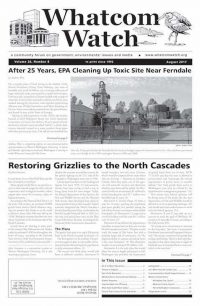by Lyle Harris
This section is devoted to studying the local impacts of specific issues the Trump Administration or Republican Congress will propose.
Ronald Reagan said this in 1983: “Since the founding of this nation, freedom of the press has been a fundamental tenet of American life. There is no more essential ingredient than a free, strong and independent press to our continued success in what the founding fathers called our ‘noble experiment’ in self-government.’” For Donald Trump, however, the approach is different: if you don’t like the question, attack the questioner. Never address the issue—change the subject and challenge the speaker. Yell “fake news” from a “dishonest media!” That’s President Trump and his supporters’ method of deflecting comments about credible information and reporting vital to make our democracy work.
The Washington Post has exposed many of the Trump Administration’s lies and distortions. As a result, Trump issued a threat by hinting that Jeff Bezos, owner of the Post, might be avoiding taxes for Amazon, his major company. Trump places conditions on press briefings that have traditionally been televised live at the White House and even posted a cartoon video on Twitter showing him beating a reporter with a CNN logo pasted on his head. Proving his disregard for women, he attacked Mika Brzezinski of MSNBC’s “Morning Joe” as “low IQ Crazy Mika,” and claimed she had been “bleeding badly from a face-lift” at a social gathering. And that, from the President of the United States!
Responsible news organizations have ethical standards that specify digging into the story and getting it right; using well accepted databases and credible sources; a willingness to retract, apologize and correct errors quickly; and presenting various points of view on controversial issues. So, when CNN aired a problem story involving the Russia investigation, it retracted the story and three people lost their jobs.
So, what standard do we get from the Trump Administration for news reporting? Ignore the facts and yell “fake news.” While this sometimes is amusing, it is an attack on the First Amendment right of freedom of the press. What that “freedom” really means is that readers have a right to information so we can make up our own minds on our government’s actions and words.
“This is not a struggle between the White House and some corporate behemoths, but a continuing, persistent and hugely unprecedented attempt by the government to limit and control what you can see or read. It’s not about us. It’s about you,” Richard Cohen, an opinion writer in the Post, said in a column leading up to Independence Day last month.
Major figures in American history have commented on the right to read. Benjamin Franklin, 1722: “Whoever would overthrow the liberty of a nation must begin by subduing the freeness of speech.” And Samuel Adams, 1768: “There is nothing so fretting and vexatious, nothing so justly terrible to tyrants, and their tools and abettors, as a free press.”
But Trump seems to have little interest in or knowledge of government or history.
So where does this leave us? Exposing Trump’s lies and failure to grasp the responsibility of the presidency is not enough, but it helps. Discussion is needed with friends of either party, and that sometimes leads in two directions: support for Trump by those who do not accept credible criticism of his presidency, or, feelings of fear for the future of our country.
Charles M. Blow, an opinion columnist for The New York Times, put it this way: “There is something insidious and corrosive about trying to evaluate the severity of every offense, trying to give each an individual grade on the scale of absurdity. Trump himself is the offense. Everything that springs from him, every person who supports him, every staffer who shields him, every legislator who defends him, is an offense. Every partisan who uses him — against all he or she has ever claimed to champion — to advance a political agenda and, in so doing, places party over country, is an offense.”
Political leaders need to take a strong stand against Trump and those who support him. Lawrence Ware, a black minister, scholar on race and leading member of the Southern Baptist Convention, recently quit the group, which is the largest national Protestant body with 15 million members.
“I’ve had enough,” he said. “I can no longer be part of an organization that is complicit in the disturbing rise of the so-called alt-right, whose members support the abhorrent policies of Donald Trump and whose troubling racial history and current actions reveal a deep commitment to white supremacy.”
According to the Pew Research Center, 78 percent of white evangelicals, many of whom are Southern Baptists, approved of President Trump’s job performance in April. “Many churches are still hostile to the Black Lives Matter movement, and even more were silent during the rise of Mr. Trump and the so-called alt-right. For all of its talk about the love of Jesus Christ, the Southern Baptist Convention’s inaction on the issues of racism and homophobia has drowned out its words,” Ware wrote.
Ruth Marcus, a Post Columnist, did not mince words: “Some of the president’s deviations from democratic and political norms slap you in the face. Attacks on federal judges for decisions that don’t go his way. Attacks on news organizations that portray him in a bad light. Misstatement piled on misstatement. Nepotism run amok. Transparency abandoned, from disclosure of tax returns to release of White House visitor records.”
And Bruce Bartlett of Politico Magazine, in “Trump is What Happens When a Political Party Abandons Ideas,” said, “conservatives are starting to accept that Trump is not the leader they had hoped for and is more of a liability for their agenda than an asset. They are also starting to recognize that their intellectual infrastructure is badly damaged, in need of repair, and that the GOP and intellectual conservatism are not interchangeable.”
Now What Happens?
The message is clear: Those of us of any party who believe our country is ignoring its noble and historical principles and is heading into destruction must take action of some kind.
David Leonhardt, Times columnist, put it this way: “The Trump era is coarsening our discourse. Too often recently I have watched people I respect spiral from a political discussion into a nasty, personal argument. So, I have a suggestion. By all means, Trump’s opponents should continue to fight — for health care, civil rights, the climate and truth itself. But there is also a quieter step that’s worth taking no matter your views, for the sake of nourishing your political soul. Pick an issue that you find complicated, and grapple with it.”
We can support political groups that expose the Trump administration’s threat to democracy. We can discuss with Trump supporters the importance of credible information and the need for integrity in White House information. We can write letters to the editor. We can support organizations that fight the destruction of historical and vital democratic processes. We can be aggressive but not offensive in discussing politics. Above all, we must take action.
For Further Reading
• ‘Trump Is What Happens When a Political Party Abandons Ideas,” Politico Magazine. http://www.politico.com/magazine/story/2017/06/24/intellectual-conservatives-lost-republican-trump-215259
• “The Hijacked American Presidency,” The New York Times. https://www.nytimes.com/2017/07/03/…/trump-hijacked-american-presidency.html
• “Why I’m Leaving the Southern Baptist Convention,” The New York Times. https://www.nytimes.com/2017/…/why-im-leaving-the-southern-baptist-convention.html
• “The President Wants to Keep Us in the Dark,” The New York Times. https://www.nytimes.com/2017/06/28/opinion/white-house-press-briefing-trump.html
• “Who Likes Trump’s Tweets and Why,” The New York Times. https://www.nytimes.com/by/susan-chira
• “Making America Scared Again Won’t Make Us Safer,” The Washington Post. https://www.washingtonpost.com/…/making-america-scared-again-wont-make-us-safer/
• “Our Fake Democracy,” The New York Times. https://www.nytimes.com/2017/06/23/opinion/our-fake-democracy.html
• “In Search of the American Center,” The New York Times. https://www.nytimes.com/2017/06/21/opinion/in-search-of-the-american-center.html
• “The Incredible Shrinking White House Briefing,” The New York Times. https://www.nytimes.com/2017/06/23/business/media/white-house-correspondents-unhappy-with-limits-on-news-briefings.html?emc=eta1
• “A Summer Project to Nourish Your Political Soul,” The New York Times. https://www.nytimes.com/2017/07/18/opinion/a-summer-project-to-nourish-your-political-soul.html?emc=eta1
• PolitiFact. (Pulitzer Prize Winner.) http://www.politifact.com/
__________________________________
Lyle Harris, a former reporter in Washington, D.C., is Journalism Professor Emeritus, Western Washington University.





























